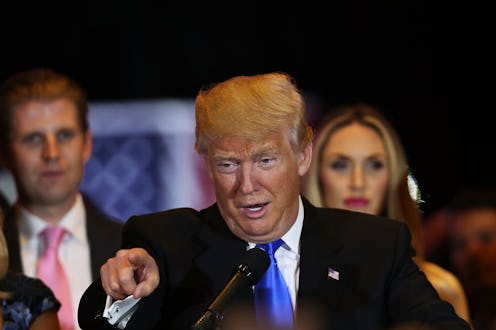News
The Possible Last-Ditch Effort To Stop Trump
Hopes of a contested Republican convention are all but dashed in the wake of the Indiana primary, as Sen. Ted Cruz and Gov. John Kasich have suspended their campaigns, leaving Donald Trump to stand alone as a candidate for the party's nomination. It may seem that the "Never Trump" movement is dead in the water, but there's a last-ditch measure — and an extreme one — which the Republican establishment could enact to resist Trump. Will there be a conservative third-party presidential run?
The stakes surrounding this question are huge. If someone challenged Trump from the right, it would tear the Republican Party apart, with some members asserting the need to unify behind Trump for a November win, and others calling for a fragmenting of the party and, with it, a likely loss in the general election.
What purpose would such a move serve? A few. In an op-ed for The Washington Post, Eliot A. Cohen, who served in the administrations of Presidents George W. Bush and George H.W. Bush, explained why tossing the election to Hillary Clinton (if she's the Democratic nominee) might be worthwhile. He thinks a strong performance from a more moderate right-wing candidate in the general election would encourage Clinton to also become more moderate, resisting the pull to the left her competitor Sen. Bernie Sanders has exerted on her rhetoric. And that, in Cohen's view, would be better than a President Trump.
Another important advantage exists in the area of congressional elections. Though voter turnout has been historically high during the 2016 primaries, that's not necessarily because people are just coming out for Trump; many of them have voted against him. As of mid-April, Trump had 40 percent of Republican primary voters' support, meaning that 60 percent of those voters have not supported him.
If a Trump nomination translates to low turnout in November due to a high number of disaffected voters, this could hurt Republicans' chances of maintaining a strong majority in the House, and a majority in the Senate at all. Tim Miller, former communications director for Gov. Jeb Bush, said concerning congressional candidates:
To the extent that there is a conservative third-party candidate that would give Republicans who can’t stomach voting for Donald Trump a person to vote for, and conceivably solve the depressed turnout problem, I think there is something to be said to that.
However, there are some obvious hurdles in place for a potential third-party bid — one being potential career suicide from incurring the wrath of many people within the Republican Party who want to grit their teeth and bear Trump. Chairman of the Republican National Committee Reince Priebus is in this camp, tweeting Tuesday night:
Aside from likely losing the GOP popularity contest, a third-party hopeful would face logistical problems. Coming into the race after it's been on for almost a year is obviously a disadvantage toward any hope of winning. Plus, the candidate would face difficulties even getting on the ballot at this point. Filing deadlines extend from June to September in various states, and each state requires a different number of signatures (or a fee in lieu of signatures in certain states). That's a tall order for a candidate coming in as late as May.
A conservative third-party run is by no means a sure thing, but one thing is sure: Such a desperate move this late in the game would send a very clear message that Trump is not the desired face of the Republican Party for many of its members.
